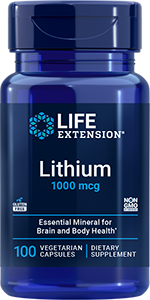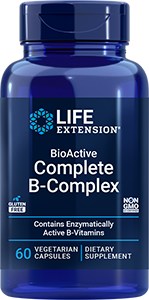
Newsletter
Newsletter
Lipoic Acid Benefits Women with Polycystic Ovary Syndrome

Women with polycystic ovary syndrome (PCOS) who were given alpha-lipoic acid daily for 12 weeks1 had improvements in insulin sensitivity and liver enzymes in a study reported online on April 15, 2024, in Gynecological Endocrinology.
PCOS is a condition characterized by elevated levels of hormones known as androgens, ovarian cysts, weight gain, difficulty becoming pregnant and/or other signs. Women with PCOS may have elevated levels of insulin and/or a family history of diabetes. Among other conditions, being overweight is associated with an increased risk of nonalcoholic fatty liver disease (NAFLD, which is also known as metabolic-dysfunction associated steatotic liver disease).
The study included 32 overweight women with PCOS who received 400 milligrams daily of ALA. Researchers conducted routine checkups and blood tests for hormones, insulin, glucose tolerance, liver enzymes and other factors at the beginning and end of the study. At the end of the treatment period, the women had lower insulin and glucose levels, increases in insulin sensitivity and liver clearance of insulin, and reduced levels of the liver enzymes ALT and AST.
“ALA represents a valid integrative approach for PCOS patients that together with an appropriate lifestyle and diet might avoid the onset of relevant health issues that these patients might develop with passing of time,” authors Alessandro D. Genazzani and colleagues at the University of Modena and Reggio Emilia in Italy concluded.
Products
Apply What You’ve Learned: PCOS
- Polycystic ovary syndrome (PCOS) is diagnosed when women have two or more of the following:
- Higher than normal levels of androgen hormones (which include testosterone, dihydrotestosterone and other hormones produced by both women and men)
- Irregular ovulation
- Polycystic ovaries characterized by 20 or more cysts detected on ultrasound2
- PCOS patients may experience ovarian cysts, infertility, weight gain, irregular periods, acne, hair loss and/or fatigue; however, signs and symptoms vary. The condition is associated with an increased risk of obesity, metabolic syndrome, cardiovascular disease, diabetes, elevated blood lipids, endometrial cancer, anxiety and depression.2
- For women who are overweight or obese, weight loss may help improve signs of PCOS. This starts with dietary changes and regular exercise.
- Inositol, omega-3 fatty acids, N-acetyl-cysteine, magnesium and curcumin are among the nutrients that may help support insulin sensitivity and other factors in women with PCOS.3-8
References
- Genazzani AD et al. Gynecol Endocrinol. 2024 Dec;40(1):2341701.
- Kostroun KE et al. F S Rep. 2022. PMID: 37398608
- Kamenov Z et al. Molecules. 2020 Nov 27;25(23):5566.
- Yang K et al. Reprod Biol Endocrinol. 2018 Mar 27;16(1):27.
- Chandil N et al. J Obstet Gynaecol India. 2019 Feb;69(1):77-81.
- Kostov K. Int J Mol Sci. 2019 Mar 18;20(6):1351.
- Luo X et al. Front Endocrinol (Lausanne). 2021 Jun 23:12:683040.
- Chien YJ et al. Nutrients. 2021 Feb 21;13(2):684.
Featured Life Extension Magazine® Article
Restore Healthy, Youthful-Looking Legs
By Laurie Mathena
The veins return blood from the extremities to the heart, where blood becomes re-oxygenated. Chronic venous disease occurs when valves in the veins of the legs become damaged, allowing blood to flow backward. This can lead to swelling, ulcers, abnormal pigmentation or varicose veins.
Diosmin is a flavonoid found in citrus which helps support vascular health. A study that evaluated the effects of diosmin in patients with chronic venous insufficiency found improvement in pain, swelling and leg discomfort among 80% of participants.
Read Full Article
What's Hot
Health Concern
Meta-analysis affirms benefits of added nutrients in PCOS
A systematic review and meta-analysis of clinical trials published November 13, 2023, in PeerJ compared the effectiveness of nutrients added to the diets of women with polycystic ovary syndrome (PCOS), a condition characterized by ovarian dysfunction and excessive production of male hormones that affects up to 15% of reproductive-aged women. "The pathogenesis of PCOS is not fully understood, but it may be associated with hyperandrogenism, insulin resistance, obesity, metabolic abnormalities, and inflammation," authors Xinyin Hu of Beijing University of Chinese Medicine and colleagues wrote.

Polycystic Ovary Syndrome (PCOS)
Find out about factors that may contribute to PCOS and how it is treated. Also, learn how a common diabetes drug, metformin, may benefit women with PCOS.
Related Life Extension Magazine® Articles

Protect Peripheral Nerves with Lipoic Acid
For decades, lipoic acid has been used to treat peripheral neuropathy in Germany. Clinical studies show that it can improve nerve function and reduce pain and numbness.

How Lipoic Acid Reduces Body Fat
A recent study found that R-lipoic acid reduced body fat and weight, especially in women—without a change in diet or physical activity.
Highlight
Wellness Blog
Life Extension’s Wellness Blog offers timely tips on nutrition and healthy living. Subscribe to get updates delivered to your email inbox as new posts appear on Life Extension’s website.
Learn MoreLife Extension Magazine® Issue Now Online
A remarkable number of healthy-longevity findings have been published over the past 18 months.





